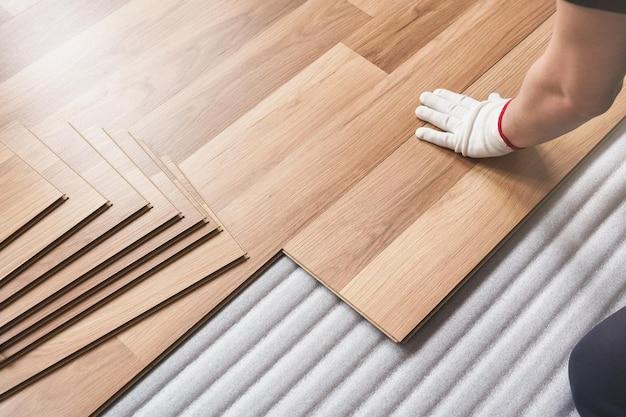Floating floors have gained popularity in recent years due to their ease of installation and attractive appearance. However, one common concern that homeowners often have is whether these floors should move when walked upon. In this blog post, we will delve into this question and explore the factors that contribute to the movement of floating floors.
Floating floors, which include laminate, vinyl, and engineered wood, are designed to “float” over the subfloor without being glued or nailed down. This floating installation method allows for natural expansion and contraction of the flooring material with changes in temperature and humidity. But does this mean it’s normal for floating floors to move when walked on? We’ll uncover the answer and provide you with expert insights on how to keep your floating floor stable and secure.
So, if you’ve been wondering why your floating floor moves, how long it should last, or if it’s okay to place heavy furniture on it, you’ve come to the right place. Let’s dive in and explore the fascinating world of floating floors!
Should Floating Floors Move When You Walk On Them
So, you’ve finally taken the leap and installed a fancy floating floor in your home. It looks beautiful, it feels great under your feet, but there’s just one question nagging at you: should floating floors move when you walk on them? Well, my friend, you’ve come to the right place to find the answer.
Understanding the Floating Floor Phenomenon
Let’s start by demystifying the floating floor. Contrary to what the name suggests, it doesn’t mean that your floor is going to start dancing the moment you step on it (although that would certainly make house chores more interesting!). Instead, the term “floating” refers to the installation method, where the flooring rests on top of a subfloor without being glued or nailed down. This allows for flexibility and expansion.
The Slight Movement Symphony
Now, let’s talk about the movement. When you walk across a floating floor, you might experience some slight shifting or bouncing action. It’s like a mini symphony beneath your feet, orchestrated by the flexibility of the floor. But fear not, this is completely normal! The slight movement is just the floor’s way of adjusting to the weight and movement of your footsteps. It’s not a sign of a faulty installation or a major catastrophe waiting to happen.
The Reason Behind the Motion
Behind this movement lies the secret of why floating floors are so popular. Floating floors are designed to accommodate changes in temperature and humidity, allowing for expansion and contraction without causing damage. So, when you walk on them, their flexibility allows for this natural movement, reducing the risk of buckling or warping.
Feeling the Comfort
Believe it or not, the slight movement you feel can actually be a good thing. It adds to the comfort factor of your floating floor. Think of it as a built-in cushioning system. Just imagine you’re walking on clouds, gently gliding across the room. It’s like a free massage for your feet with every step!
When to Be Concerned
Of course, like with any other aspect of life, there can be too much of a good thing. If your floating floor moves excessively or makes creaking noises that resemble a herd of elephants tap dancing, then it might be time to investigate further. Excessive movement can be a sign of poor installation, an uneven subfloor, or other underlying issues. In such cases, it’s best to consult a professional to assess the situation and make any necessary adjustments.
Embrace the Ebb and Flow
So, here’s the bottom line: a little movement is expected and normal for floating floors. It’s a small price to pay for the benefits of flexibility and durability that they offer. So, embrace the ebb and flow beneath your feet and enjoy the comfort and beauty of your floating floor. After all, life is too short to worry about floors that dance, right?
In conclusion, floating floors are designed to move slightly when you walk on them. This movement is a natural characteristic of their flexible installation method and should not be a cause for concern. Embrace the comfort and durability of your floating floor, and remember that a little movement can be a good thing. So, go ahead, take a step, and enjoy the dance!
FAQ: Should Floating Floors Move When Walking On Them
Can You Put a Fridge on a Floating Floor
No problem! You can confidently park your fridge on a floating floor. Just make sure to use fridge pads or furniture sliders to prevent any scratches or damage to your beautiful flooring.
Why Does My Laminate Floor Feel Spongy
Ah, the spongy sensation! Don’t fret, it’s not because you accidentally turned your living room into a trampoline. This sponginess might be due to an uneven subfloor or an improper installation. Consider calling in a flooring professional to give your floor the TLC it deserves.
Can I Use Liquid Nails on Vinyl Flooring
While it might sound tempting to whip out the Liquid Nails, we don’t recommend it. Vinyl flooring needs space to expand and contract, and gluing it down can hinder that flexibility. Stick to the manufacturer’s guidelines and use appropriate adhesives to keep your vinyl floor happy.
Do Floating Floors Really Move
Well, it’s not like they have legs and can take a stroll while you’re not looking. But yes, floating floors can have a little wiggle. Don’t worry, though – it’s completely normal. The slight movement allows for the expansion and contraction of the flooring material, especially when changes in temperature and humidity come into play.
How Long Do Floating Floors Last
Floating floors are in it for the long haul! With proper maintenance and care, they can last anywhere between 20 to 30 years. That’s longer than most fashion trends, so your flooring will keep looking sleek and stylish for a good while.
Why Do Floating Floors Fail
Floating floors can sometimes experience failure, but don’t take it personally. The most common culprits are poor installation, insufficient acclimation time, or skimping on underlayment. So, make sure you choose a qualified installer, give the floor time to adjust to its environment, and don’t skimp on that cushiony underlayment goodness.
Which Is Better: Glue Down or Floating Floor
Ah, the age-old debate – glue down versus floating floor. Well, it depends on your specific needs and preferences. Glue down floors offer more stability and are ideal for areas with heavy foot traffic. On the other hand, floating floors offer easier installation and can be a DIYer’s dream. It’s like choosing between a cozy cabin or a breezy beach house – the choice is yours!
Can You Put a Washing Machine on a Floating Floor
Absolutely, you can do your laundry happy dance without worrying about damaging your floating floor. Just be mindful of the weight distribution and aim to place a moisture barrier beneath the washing machine. Keep those spin cycles spinning!
Is It Okay to Put Cabinets on a Floating Floor
No need to leave your cabinets feeling left out! You can definitely place cabinets on a floating floor. But please, please, pretty please, make sure they are adequately secured to the wall. We don’t want any toppling accessories in the kitchen.
How Do I Keep My Laminate Floor from Moving After I Install It
If your laminate floor decides to join in on your dance routines, here’s a nifty trick – grab some furniture pads or adhesive felt pads. Apply them to the bottom of your furniture legs and voila! Your flooring will thank you for the extra support, and you can groove worry-free.
Can You Put Heavy Furniture on Floating Floors
Heavy furniture can plop itself right on top of your floating floor without any issues. However, we recommend using furniture pads or casters to prevent scratching or indentations. Your floating floor can handle the weight, but let’s keep it looking spiffy!
Should My Laminate Floor Bounce
Bouncy floors might be fun at a trampoline park, but not so much in your living room. If your laminate floor is bouncing, it could indicate an issue with the subfloor or an installation error. Don’t jump to conclusions, though – consult a flooring professional to address this bouncy situation.
Can You Roll a Refrigerator on Vinyl Plank Flooring
Rolling a refrigerator? That sounds like quite the workout! But if you must move your fridge on vinyl plank flooring, lay down some plywood or a similar protective surface to prevent any unintentional scratches or damage. Safety first, my friend!
What Happens If You Nail Down a Floating Floor
Oh boy, nailing down a floating floor is like trying to put a square peg in a round hole – it just doesn’t work. Nails will interfere with the floor’s natural expansion and can lead to unsightly gaps or buckling. Stick to the manufacturer’s recommendations and avoid the temptation of playing carpenter with your floating floor.
What Is the Advantage of a Floating Floor
Float like a butterfly, sting like a bee – that’s the mantra of a floating floor. The main advantage is its flexibility and easy installation. With floating floors, you can adapt to different subfloors, enjoy faster setup times, and even take them with you if you decide to move. It’s like having a portable dance floor at your disposal!
Can a Floating Floor Be Glued Down
Well, technically, it’s not floating anymore if you glue it down. But yes, in certain situations, you may choose to glue down a floating floor. Just remember to check the manufacturer’s guidelines to ensure compatibility and maintain the warranty. Keep that floor happy – whether floating or grounded!
Why Does My Laminate Floor Move When I Walk on It
If your laminate floor seems to be doing its own version of the cha-cha, it might be due to an underlayment issue. Ensure you have a suitable underlayment that provides stability and reduces movement. It’s all about finding that perfect dance partner for your laminate floor!
How Do I Keep My Floating Floor from Moving
To keep your floating floor grounded (pun intended), use underlayment materials that have good gripping capabilities. Additionally, furniture pads and adhesive felt pads are a great way to anchor your furniture and minimize any unwanted floor shuffling. Dance moves are optional but highly encouraged!
There you have it, a floating floor FAQ extravaganza! Now you’re armed with knowledge, humor, and the ability to gracefully maneuver your way through the world of floating floors. Happy flooring adventures!
Disclaimer: The information provided in this FAQ is for educational and entertainment purposes only. Always consult with professionals for specific advice regarding your flooring needs.

